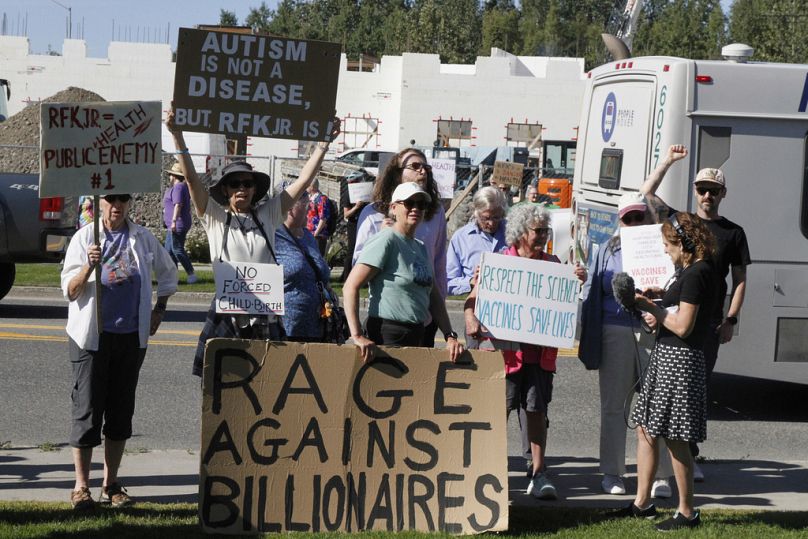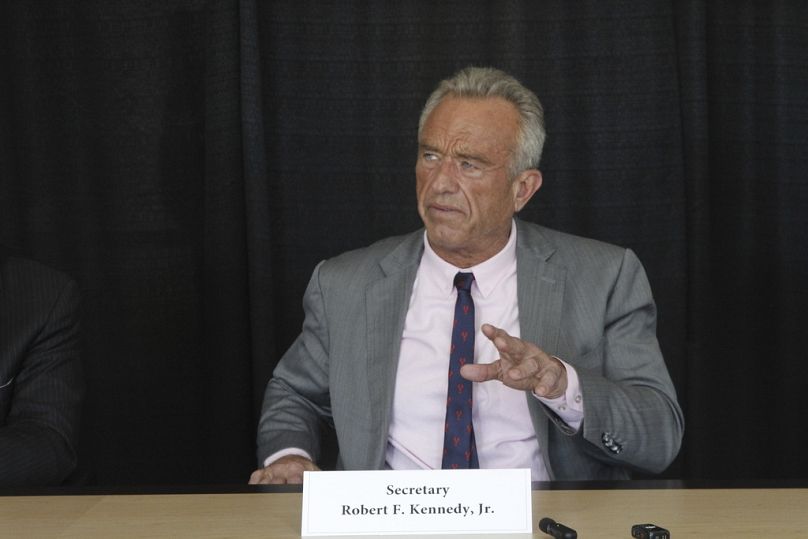The US Department of Health and Human Services will cancel contracts and withdraw funding for some vaccines, currently under development, to fight respiratory viruses like the flu and COVID-19.
Robert F. Kennedy Jr. announced in a statement on Tuesday that close to two dozen projects, totalling roughly $500 million (€432 million), to develop vaccines using messenger ribonucleic acid (mRNA) technology will be halted.
Kennedy’s decision to terminate the projects and withdraw their funding is the latest in a series of decisions to crack down on immunisation. The longtime vocal vaccine critic has pulled back recommendations for the COVID-19 shots, fired the panel that makes vaccine recommendations and refused to offer an endorsement for a vaccine amid a worsening measles outbreak.
The US health secretary slammed mRNA vaccines in a video posted on his social media pages, explaining the reasoning behind the decision to cancel projects led by US pharmaceutical giants, including Pfizer and Moderna.
“To replace the troubled mRNA programmes, we’re prioritising the development of safer, broader vaccine strategies, like whole-virus vaccines and novel platforms that don’t collapse when viruses mutate," Kennedy said.
Infectious disease experts say mRNA technology used in modern vaccines is safe. They credit its development during the first Trump administration in 2016 with slowing the 2020 coronavirus pandemic. They warn future pandemics will be difficult to contain without mRNAs.
“I don’t think I’ve seen a more dangerous decision in public health in my 50 years in the business,” said Mike Osterholm, a University of Minnesota expert on infectious diseases and pandemic preparations.

He noted that mRNA technology offers potential advantages of rapid production, crucial in the event of a new pandemic that requires a new vaccine.
Paul Offit, a vaccine expert at Children’s Hospital of Philadelphia criticised Kennedy Jr’s approach, calling it short-sighted.
“It's certainly saved millions of lives,” Offit said of the existing mRNA vaccines.
Older vaccines have traditionally required growing pieces of viruses, often in chicken eggs or giant vats of cells, then purifying that material.
The mRNA approach starts with a snippet of genetic code that carries instructions for making proteins. Scientists pick the protein to target, inject that blueprint and the body makes just enough to trigger immune protection — producing its own vaccine dose.

MRNAs are used for more than just infectious disease vaccines, with researchers and biologists around the world experimenting with its potential for cancer treatment.
In a statement Tuesday, the Department of Health said “other uses of mRNA technology within the department are not impacted by this announcement."
The abandoned mRNA projects signal a “shift in vaccine development priorities,” the health department said in its statement, adding that it will start “investing in better solutions.”
Speaking hours after the announcement in Anchorage, Alaska, the US health chief stressed that work is underway to procure an alternative to mRNAs, adding that a “universal vaccine” that mimics “natural immunity” is the department and administration’s objective.







